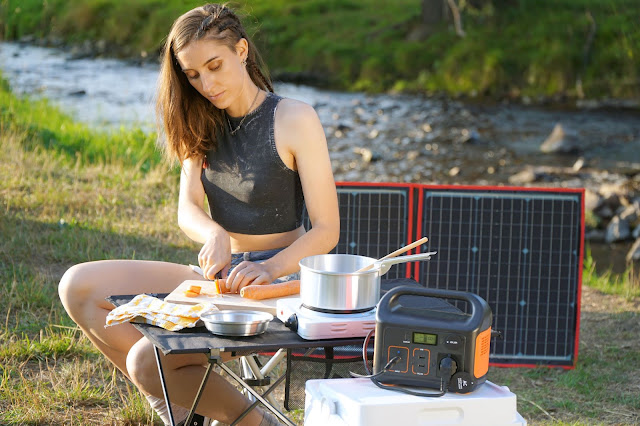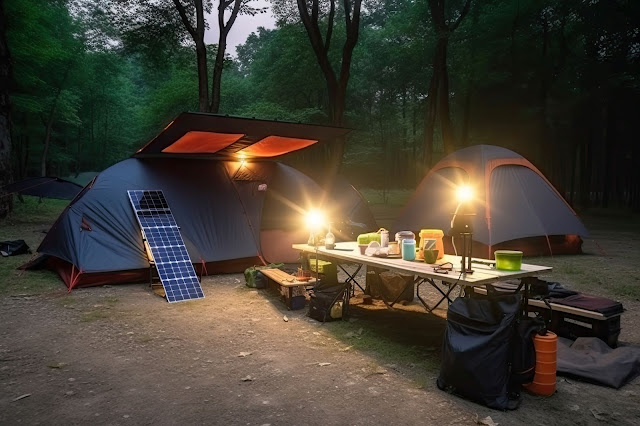As the world continues to shift towards renewable energy sources, the use of solar panels has seen a significant rise among travelers. Harnessing the sun's energy has become an increasingly popular choice for those on the move. Whether it's for powering a camper van in the wilderness or charging devices during a beach holiday, solar power offers a versatile and sustainable solution.
Portable solar panels offer a sustainable and cost-effective solution for power needs while traveling. However, to make the most of this eco-friendly equipment, it's crucial to understand how to use it correctly. Misuse or inadequate knowledge can lead to inefficiencies, potential damage, or even safety risks.
This article aims to shed light on the dos and don'ts of using solar panels while traveling. Whether you're a seasoned traveler looking to switch to a greener power source or a beginner in using solar power planning your first off-grid adventure, this guide is for you.
Dos Of Using Solar Panels While Traveling
Ready to hit the road with solar panels? Here's a list of dos to ensure a successful and eco-friendly outdoor adventure.
1. Do Your Research Before Buying
Firstly, it's crucial to do your research before setting off. Understanding your power needs is a fundamental step in this process. It's also beneficial to explore the different types of solar panels available in the market. This knowledge will guide your purchase decision, ensuring you select a panel that aligns with your specific needs and travel conditions.
2. Do Consider The Size And Weight
Size and weight are also significant factors to consider. The essence of travel is portability, and your solar panel should align with this principle. Choose a solar panel that's easy to carry and doesn't add unnecessary weight to your luggage. The right size and weight can make a substantial difference in your travel experience.
3. Do Charge In Optimal Sunlight
Solar panels work best in direct sunlight. Therefore, it's important to position them in a way that they receive maximum exposure. The position of the sun in the sky changes throughout the day. Therefore, adjusting the orientation of the panels to face the sun directly can significantly improve their efficiency.
Moreover, the intensity of sunlight varies depending on the time of day. Midday sun, when the sun is at its highest point, usually provides the most power. Therefore, it's beneficial to charge your panels during these peak sunlight hours.
4. Do Regularly Clean Your Panels
Cleanliness is another crucial aspect that shouldn't be overlooked. Dust and dirt can accumulate on the surface of your panels, hindering their performance. Regular cleaning keeps your panels at their best, ensuring optimal performance and longevity.
5. Do Use A Solar Charge Controller
Lastly, consider investing in a solar charge controller. This device plays a key role in preventing battery overcharge, which can lead to reduced efficiency or even damage. A solar charge controller is a must for safe and efficient solar power use.
Don’ts Of Using Solar Panels While Traveling
Just as there are best practices to follow when using solar panels, there are also certain actions that should be avoided. Here are some key don'ts to keep in mind.
1. Don’t Ignore The Weather
While solar panels can still function in cloudy weather, their efficiency is significantly reduced. Moreover, extreme weather conditions like hail or heavy snow can potentially damage the panels. Therefore, it's important to protect your panels and adjust your power usage plans according to the weather.
2. Don’t Leave Panels Unattended
Leaving your solar panels unattended is another action to avoid. Not only are solar panels valuable, but they can also pose a safety risk if they're knocked over or damaged. When you're not around, secure your panels and ensure they're safe from potential hazards.
3. Don’t Forget To Monitor Battery Levels
Forgetting to monitor battery levels is another don't. Keeping track of your battery levels can help you manage your power usage more effectively and prevent over-discharge, which can harm the battery. Regularly check your battery levels and adjust your power usage accordingly.
4. Don’t Overload Your System
It's important to understand the capacity of your solar panel system and not to exceed it. Overloading the system can lead to inefficiencies and potential damage. Always check the power requirements of your devices and ensure they're compatible with your solar setup.
5. Don’t Forget To Plan For Storage
Solar panels generate power during the day, but what about at night or during extended periods of poor weather? It's important not to overlook the need for a reliable storage solution, such as a high-capacity power bank or a solar-compatible battery system. Without adequate storage, you risk being left without power when you need it most. Always plan for how you'll store the power your panels generate for use when they're not actively charging.
Conclusion
Harnessing solar power while traveling is an excellent way to meet energy needs in an eco-friendly manner. However, to make the most of this renewable energy source, it's crucial to understand the dos and don'ts of using solar panels. By adhering to these guidelines, travelers can confidently embrace solar power, making their adventures more sustainable and enjoyable.
FOLLOW MY ADVENTURES ON YOUTUBE @PinoyAdventurista
Thank You For Sharing! |





0 comments :
Post a Comment
Looking for Budget Travel Guide Blogs, Hotel Reviews, and Sample DIY Itineraries?
Welcome to Pinoy Adventurista, "Your Next Ultimate Adventure Starts Here!"
Pinoy Adventurista is one of the Top Travel Blogs in the Philippines and the World. In 2013, he visited all the 81 provinces in the Philippines.